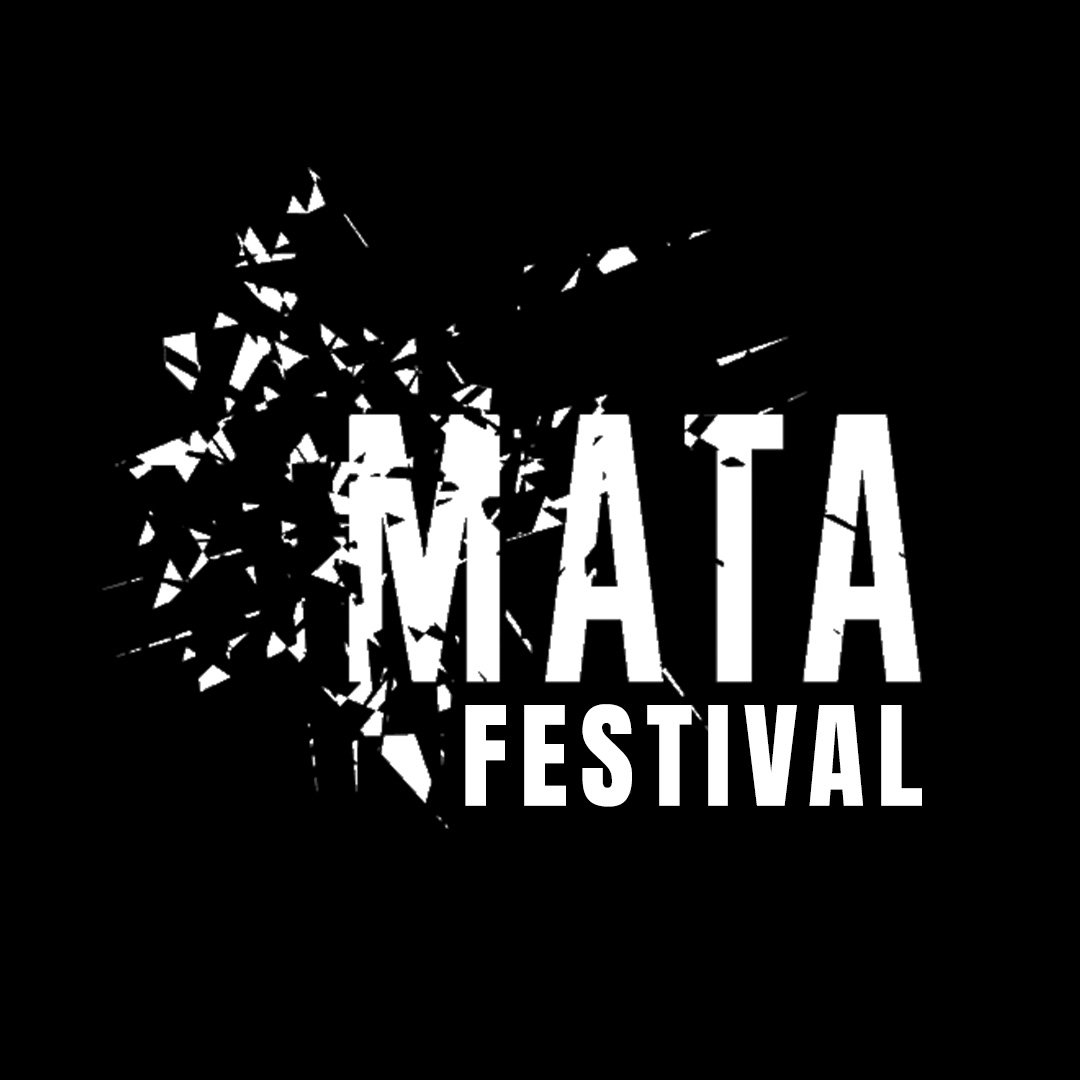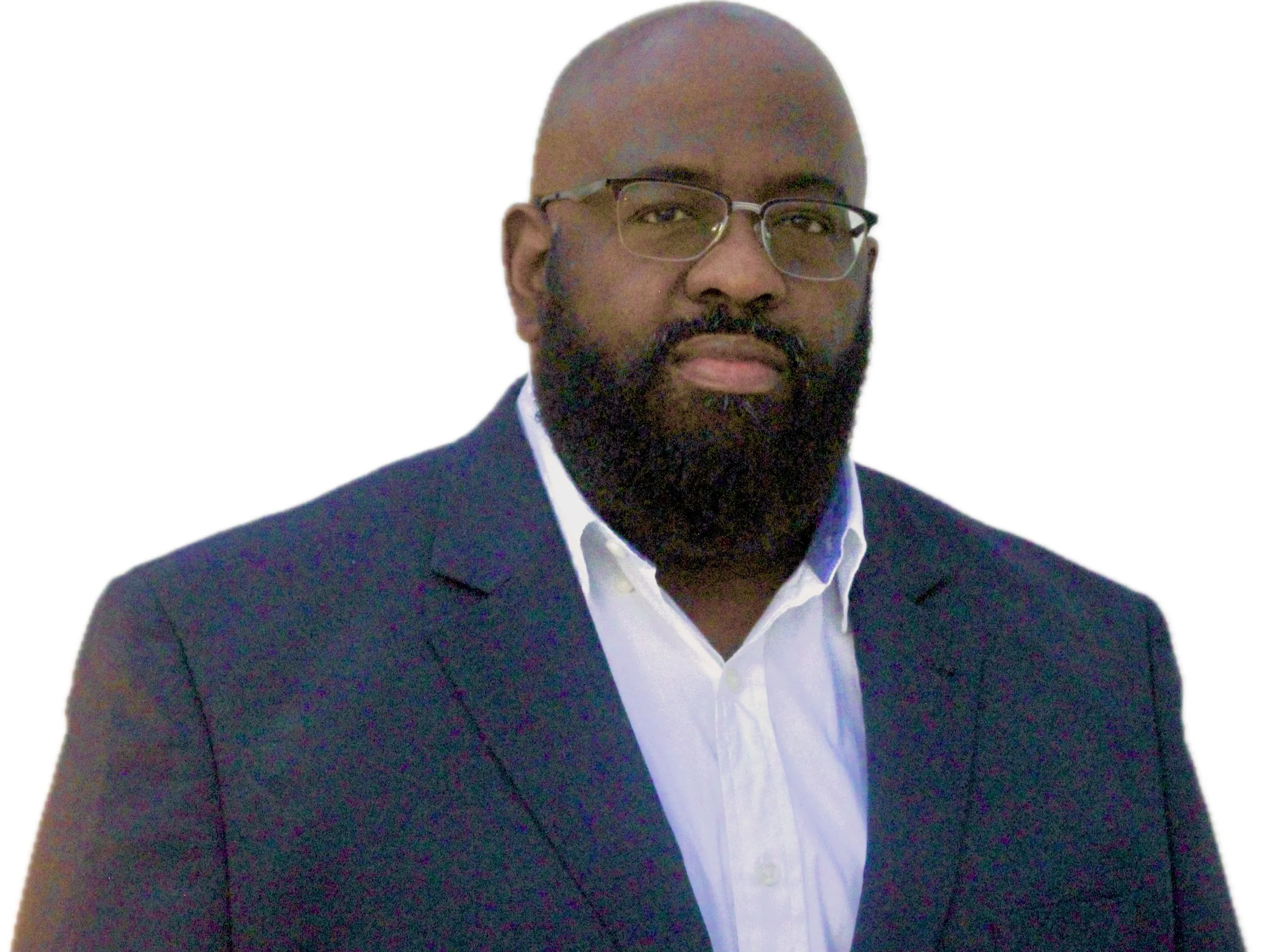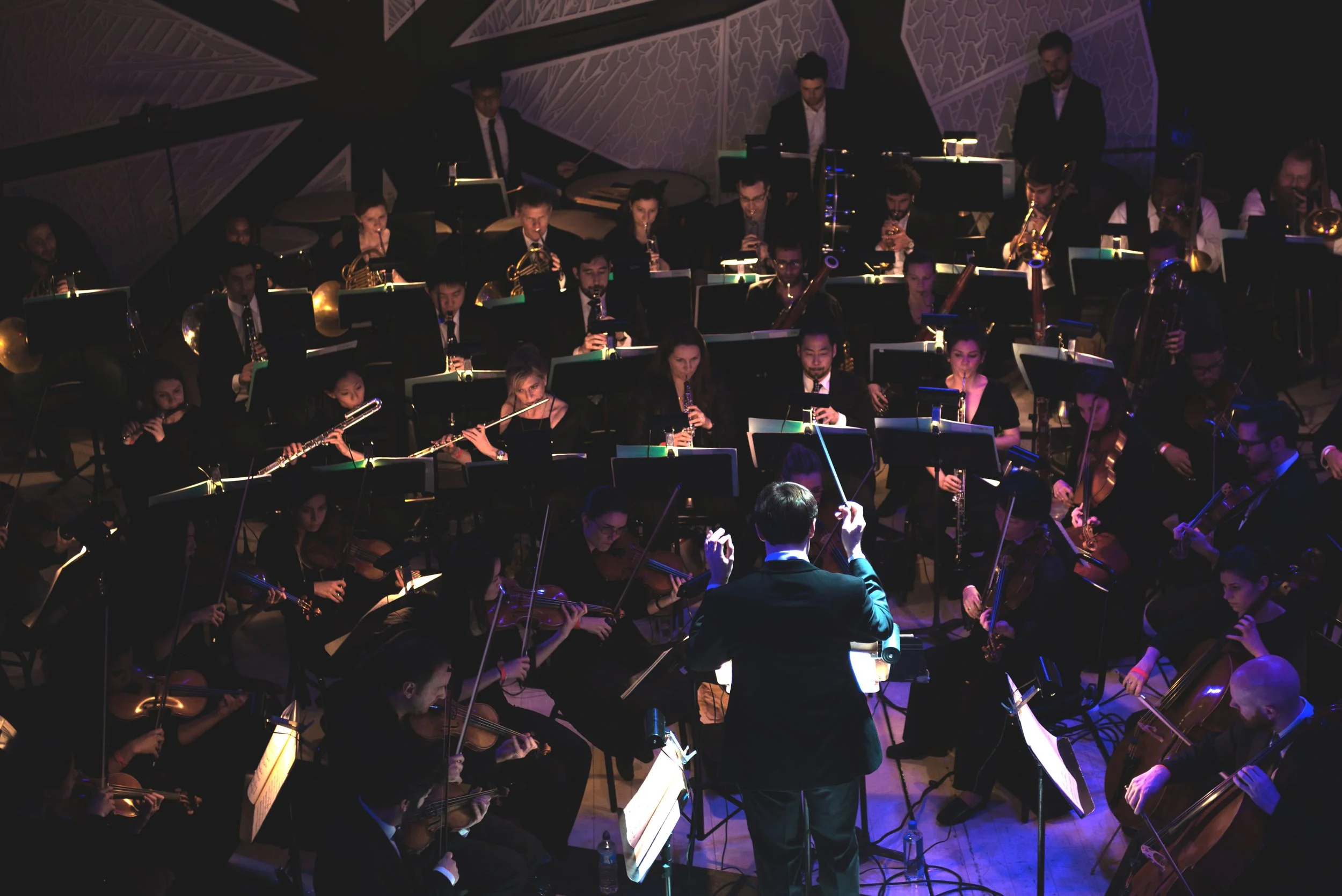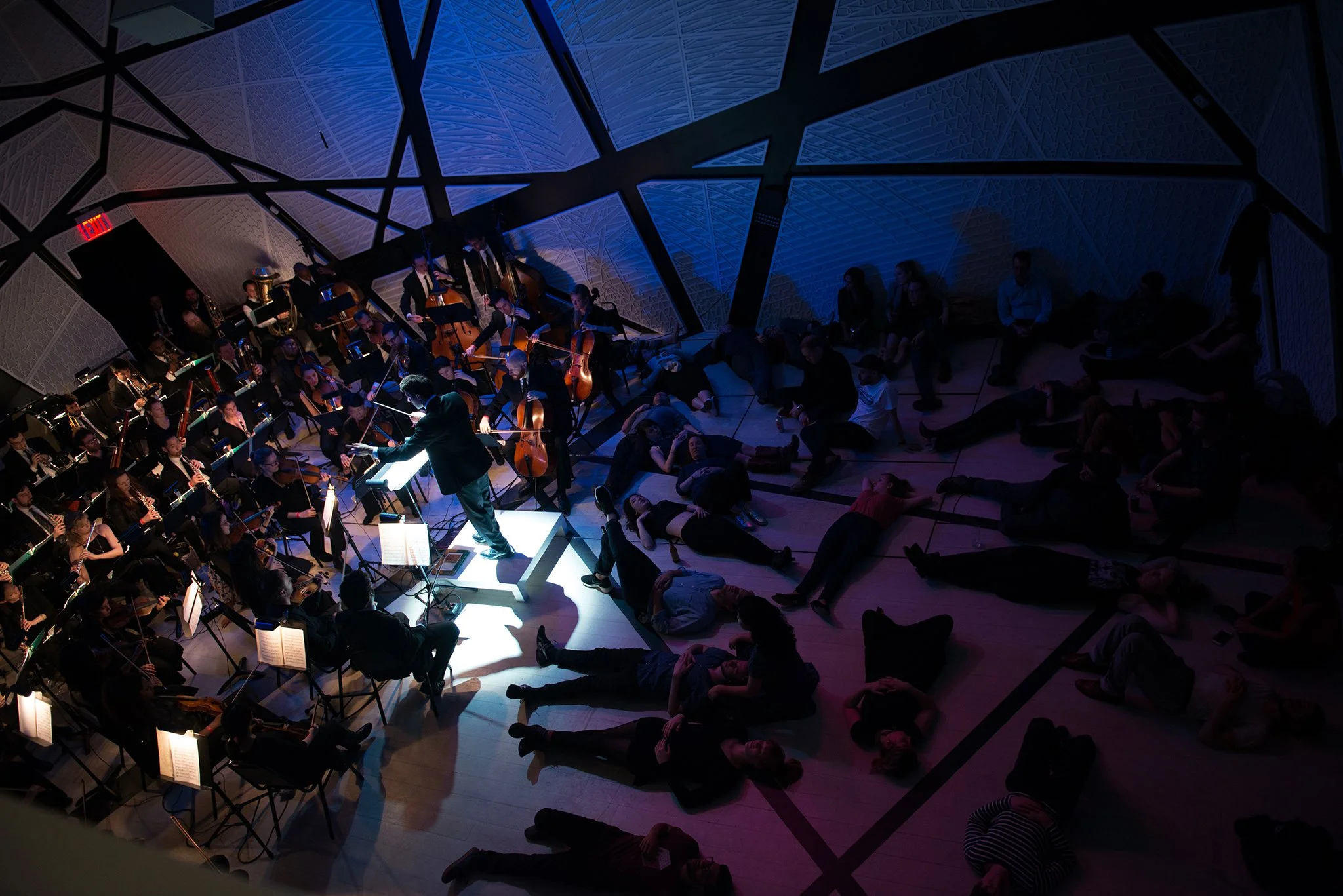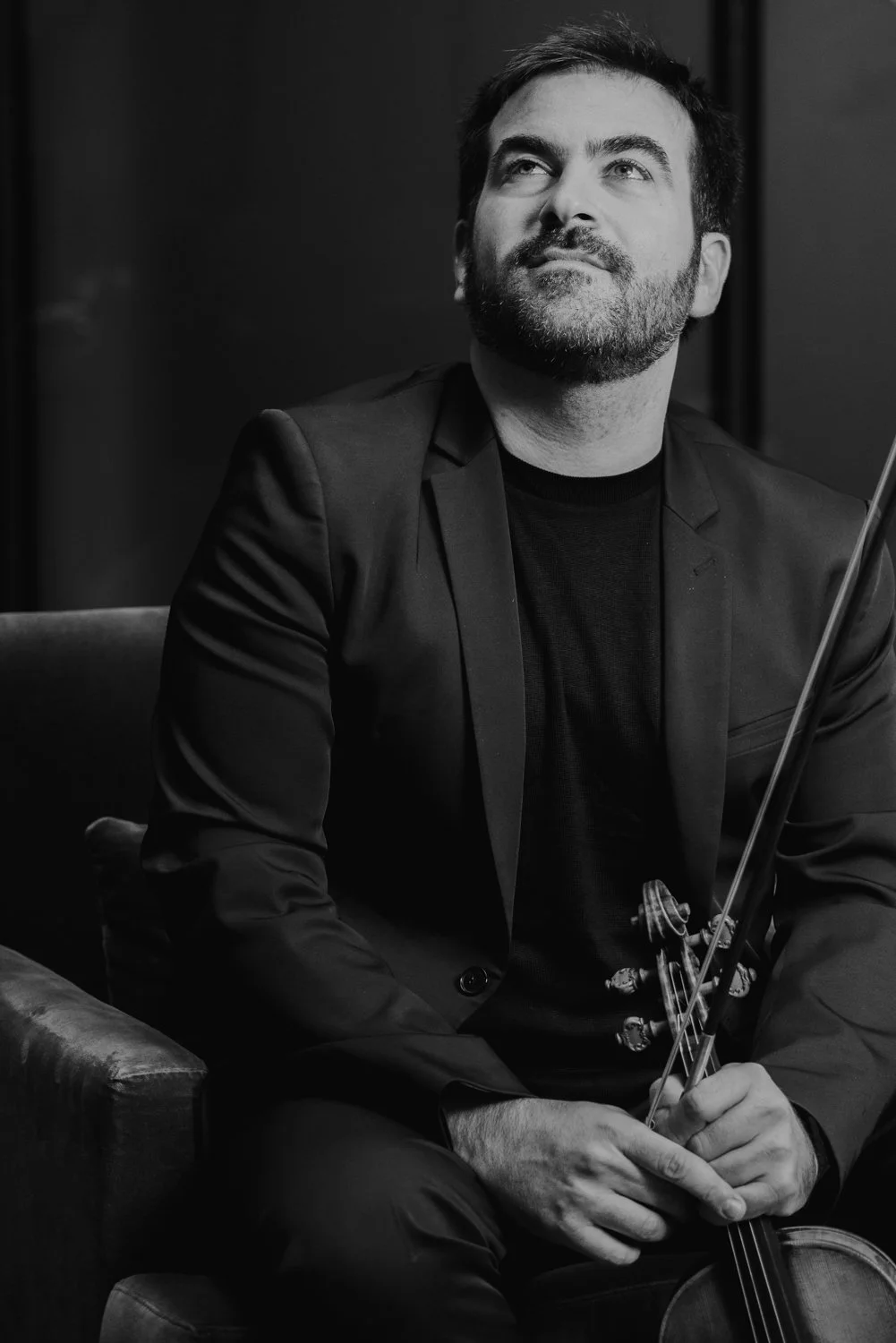Press “1” for Cello
Missed Deadline (2020),
Cristina Spinei
Missed Deadline was commissioned by my friend and brilliant cellist Yves Dhar. Yves wanted a showy piece to be able to perform when people ask him to “play something!” at parties or gatherings. It is a fast-paced work filled with ostinati, chopping, and fun grooves. I’ll leave it to you to guess how the title came about...
Nrtya ( नृत्य ) (2023),
Adonis Gonzalez-Matos
Nrtya, meaning dance in Hindi, is a musical piece that artfully blends dance rhythms originating from India, West Africa, and the Caribbean Islands. In this unique composition, the cellist takes on a dual role, not only playing the cello but also incorporating percussion instruments to emulate the spirit of dance. Through "Nrtya," the aim is to create a harmonious synthesis of diverse cultural influences and showcase the virtuosity of its dedicatee.
Plant Church (2023),
Nathan Schram
Plant Church is a psychedelic journey into an overstimulated subconscious. The music weaves through primordial dust, a mechanistic working life, stupefying social interactions and a final journey through the celestial orbs of our universe.
Automation (2022), Adam Schoenberg
Automation: Concerto for Human and AI Cellists explores the complex relationship between man and machine. Can a technically superior machine with no soul make music that moves us? How will humans feel if that machine can replace us? Cellist Yves Dhar goes “bow-to-bow” onstage with holographic AI cellist AGNES (Automatic Generator Network of Excellent Songs) in this groundbreaking work by Emmy-winning, Grammy-nominated composer Adam Schoenberg that features cello, halldorophone, electronics, orchestra, and visual projections.
Cellist Yves Dhar – praised for his “richly textured sounds” (New York Times) and “technically and interpretatively outstanding” playing (Strad Magazine) – joins the Grammy-winning Experiential Orchestra led by Music Director James Blachly for the NYC premiere of Automation by Adam Schoenberg, who has twice ranked among the top ten most performed living composers in the U.S. The work explores the musical implications of machine learning and the degree to which human musical expression can survive digital mediation. Automation is perhaps best described as a double concerto for two cellos, but the work involves electronics and visual projections, and the second cellist is a hologram the creators have dubbed AGNES (Automatic Generator Network for Excellent Songs), and it plays music that was written by an AI algorithm. Adding yet another unique element to the mix, Dhar doubles on a futuristic instrument called the halldorophone, the building of which was commissioned for this performance.
Developed over a five-year period by Dhar and Schoenberg, who met as doctoral students at Juilliard, Automation was conceived as a work that would reflect its historical moment, expand the symphonic palette, be relevant to the mainstream conversation, and attract younger and non-traditional audiences to the concert hall.
The machine algorithm – a Generative Adversarial Network that was taught to compose using Schoenberg’s previous works as data – was built by Kathryn Leonard, Professor of Computer Science at Occidental College, and her partner Ghassan Sarkis, Associate Professor of Mathematics and Statistics at Pomona College. They named their brainchild AGNES (Automatic Generator Network of Excellent Songs). AGNES was, after a period of months, able to generate original musical content that Schoenberg included in his score without alteration. That music, at times humanly impossible to play live, was then pre-recorded by Dhar (who also served as the model for the hologram), processed through synthesizers and quantized to create an acoustic/electronic hybrid sound that is played back live and synced with the holographic cellist’s movements.
Icelandic artist and designer Halldór Úlfarsson’s halldorophone – superficially resembling a cello but in fact a drone-like electro-acoustic instrument that produces distortion, frequency beats, feedback, and rich overtones – can be played with a bow but is sensitive enough to play just by touching the fingerboard. Only a few of the instruments exist; the one featured in Automation was specially commissioned for the work by Occidental College and still remains the only one featured on the symphonic stage. Despite their scarcity, the demand for halldorophones is high after they were prominently used in the film scores for Joker and Arrival by Oscar-winning composer and cellist Hildur Guðnadóttir. An ideal symbol for the intersection of human music-making and AI, a halldorophone is aleatoric: the musician causes it to sound but is not meaningfully in control of the result. As Dhar puts it: “One is constantly searching for new sounds and you never know how the instrument is going to react. Somehow, its weird, mesmerizing sounds just draw you in.”
Automation is a piece of program music, in a manner not unlike that of Richard Strauss’s tone poems. The narrative begins when a lone human cellist builds a duo partner using the latest AI, 3D-scanning and robotics technologies. Built for exponential learning, AGNES soon imitates, matches, and surpasses the skill level of its creator. The “Battle Mode” section of the work is a game of musical one-upmanship that AGNES inevitably wins, finishing with a flourishing coda full of intervals, rhythms, and speeds not possible for a human. These pyrotechnics overload AGNES’s neural network and it short-circuits.
AGNES’s prowess prompts an existential crisis in the human cellist. He moves to the halldorophone, lost in the perfection of a digital world over whose ethereal beauty he has little control. At this critical moment he is brought back to himself and his cello with a haunting orchestral chorale, music of soothing simplicity that is intended to represent the pinnacle of human expressiveness. Secured in the beauty and imperfection of humanity, the cello sings an aching melody and expounds on it in traditional heart-on-sleeve fashion. It builds up with orchestral fanfare to a symphonic climax that then reposes in profound and sighing denouement. In the last few seconds of the work, an echo of AGNES returns; like the very act of creating a machine to render oneself obsolete, this seems a singularly human gesture of ambiguity.
Cristina Spinei
Cristina Spinei is a Juilliard-trained composer who has written for numerous orchestras and chamber ensembles. She is best known for her work with dance, having been commissioned by the Joffrey Ballet, Nashville Ballet, Parsons Dance, Pacific Northwest Ballet, and many more. Self-described as “minimalish,” Cristina anchors her musical ideas in melody, movement, and loops, informed by her love of multimedia collaboration.
Cristina has been active in the web3 space since 2020. Her work Prelude, recorded by the Gateway Chamber Orchestra, was the first new orchestral piece to be released as an NFT. Cristina’s other collaborative NFTs include a programmable string quartet for Async Art, audiovisual Triptych with artist Marterium, and Occulta Verba — an audiovisual cryptogram created with artist luxpris.
Adonis Gonzalez-Matos
Pianist, composer, and conductor Adonis Gonzalez-Matos, a Latin Grammy nominee for his solo debut album 'Adios a Cuba,' marked his conducting debut with the Vienna International Orchestra in Austria. As a soloist, he's collaborated with globally renowned orchestras, including The Stuttgart Radio Symphony Orchestra and the National Symphonies of Cuba, Venezuela, and Costa Rica, among others. He has showcased his talent at some of the most distinguished venues in the U.S., including Lincoln Center, Carnegie Hall, and The Kennedy Center.
His versatility as a composer extends across chamber and orchestral works, film scores, and dance compositions. A former composer in residence of the Rockefeller Brothers Fund, he contributed to the 'Works and Process Series' at the Guggenheim Museum. Recent compositions were featured in the DIALOGUES Series of ComposersNow, curated by composer Tania León. The Trisha Brown Dance Company commissioned and premiered his latest dance score. Dr. Gonzalez, holding a doctoral degree from Rutgers University, currently serves as a Professor of Music at Alabama State University.
Nathan Schram
Nathan Schram is a two-time GRAMMY® Award-winning composer and violist of the Attacca Quartet. Nathan has collaborated, in the studio and on stage, with many of the great artists of today including Björk, James Blake, Finneas and Billie Eilish, David Crosby, Becca Stevens, Itzhak Perlman, and others. Nathan is a PhD Candidate in music composition at Princeton University and an Honorary Ambassador to the city of Chuncheon, South Korea.
Nathan has released two solo records of his own compositions, Nearsided and Oak and the Ghost, on Better Company Records and New Amsterdam Records, respectively. As a member of Attacca, Schram has released records on Sony Classical, GroundUP Music, Nonesuch, and New Amsterdam Records. Attacca’s records, Orange and Evergreen, won GRAMMY® Awards for Best Chamber Music Performance in 2020 and 2023. His arrangement of Radiohead’s 2 + 2 = 5 written for Becca Stevens and Attacca Quartet was also nominated at the 2023 GRAMMY Awards.
Apart from performing, Nathan is the Founder and Artistic Director of Musicambia. Founded in 2013, Musicambia develops music education programs and performances inside prisons and jails throughout the United States.
Adam Schoenberg
Emmy Award-winning and GRAMMY® nominated Adam Schoenberg has twice been named among the Top 10 most performed living composers by Orchestras in the United States. With more than 300 orchestral performances worldwide, his works have received performances and premieres at the Kennedy Center, Library of Congress, New York Philharmonic, San Francisco Symphony, National Symphony Orchestra, The Cleveland Orchestra, and twice with the Los Angeles Philharmonic at the Hollywood Bowl. Recent commissions include his percussion concerto (Losing Earth), violin concerto (Orchard in Fog) for Anne Akiko Meyers (2014 Classical Billboard Artist of the Year) and the San Diego Symphony, and a concerto for orchestra for the Atlanta Symphony Orchestra. His latest album with the Kansas City Symphony was nominated for two GRAMMYs, including Picture Studies as Best Contemporary Classical Composition.
For film and TV, Schoenberg has scored several projects including GRACELAND, which premiered at the Tribeca Film Festival, his Emmy Award-winning score to Artbound's (PBS/KCET) documentary THAT FAR CORNER: Frank Lloyd Wright in Los Angeles, and the current theme package for ABC’s NIGHTLINE. He lives in Los Angeles with his wife, playwright and TV writer Janine Salinas Schoenberg, and their two sons, Luca and Leo.
Yves Dhar
Yves Dhar plays the cello. He has played it in famous places (Carnegie Hall, Kennedy Center, NYC FASHION WEEK, United Nations, Rikers Island) and not-so-famous places (schools for special needs, children’s hospitals, youth sports clubs, retirement homes, designer boutiques). He has shared the stage with many celebrated artists (Itzhak Perlman, Christina Aguilera, Arijit Singh, Bert from Sesame Street). If you haven’t seen him in concert halls, you might have heard him in films, TV, or ads (Annie; Allure; HBO’s The Plot Against America; Budweiser, Disney, VISA, Micoli Studio). He teaches cello, social advocacy, and arts entrepreneurship at Vassar College, in masterclasses around the world, and privately online. Perhaps, most importantly, Dhar co-founded nonprofits (Cello Makes Everything Better, New Docta) to inspire others with music and make the world a better place.
Experiential Orchestra
The Grammy®️-winning Experiential Orchestra (EXO) brings audiences close to the music by engaging listeners through imaginative, immersive, and interactive concert experiences. Founded by Music Director James Blachly in 2009, EXO’s performances and recordings have been described as “strikingly persuasive” by the San Francisco Chronicle and “immaculate” by Musical America, and have been praised for having “luscious tone and poise” by Classics Today. EXO was founded on collaboration and co-creation, and each curated performance is imbued with a generous spirit of celebration, facilitating the exploration of what Blachly calls, “a new experience of sound” by audiences. The orchestra’s performances take place in and outside the concert hall with audiences invited to participate in unorthodox ways. EXO has performed the music of Arvo Pärt in the Temple of Dendur at The Metropolitan Museum of Art, invited audiences to dance during Stravinsky’s Rite of Spring and Tchaikovsky’s Nutcracker at National Sawdust, enveloped the audience in concerts at Lincoln Center with audience and orchestra members sitting together, and presented Symphonie fantastique and Petrushka with circus choreography at The Muse in Brooklyn. The orchestra’s world premiere recording of Dame Ethel Smyth’s The Prison (1930) was released on Chandos Records in 2020 to international critical acclaim in The New York Times, Gramophone, The New Yorker, The Guardian, and many other publications. The album won the Grammy®️ for Best Classical Solo Vocal Album in 2021 – the first Grammy ever awarded for Smyth’s music.
Experiential Orchestra Musicians: Sami Merdinian (Concertmaster); Lauren Cauley (Violin); Josh Henderson (Violin); Jennifer Liu (Violin); Hajnal Pivnick (Violin); Rannveig Marta Sarc (Violin); Nick Revel (Principal Viola); Eva Gerard (Viola); Mira Williams (Viola); Hamilton Berry (Principal Cello); Titilayo Ayangade (Cello); Caleb van der Swaagh (Cello); Nathaniel Chase (Principal Bass); Andrew Roitsetein (Bass)
James Blachly
James Blachly is a Grammy®-winning conductor dedicated to enriching the concert experience by connecting with audiences in memorable and meaningful ways. James Blachly serves as Music Director of the Johnstown Symphony Orchestra and of the Experiential Orchestra, and is a versatile guest conductor in diverse repertoire with orchestras including New York Philharmonic, the Detroit Symphony Orchestra, Rochester Philharmonic Orchestra, New Haven Symphony Orchestra, Carnegie Mellon Philharmonic, and WDR Funkhausorchester.
With the Experiential Orchestra (EXO), Blachly has conducted the works of Arvo Pärt at The Metropolitan Museum of Art, invited audiences to dance to Stravinsky’s Rite of Spring and Tchaikovsky’s Nutcracker, sit within the orchestra at Lincoln Center, and engage with Symphonie fantastique and Petrushka with circus choreography at The Muse in Brooklyn. During his most recent season, he led the Experiential Orchestra in a subscription concert at the Phillips Collection, in an immersive performance of Strauss’s Four Last Songs with cellist Andrew Yee and soprano Sarah Brailey, and gave the New York premiere of Julia Perry’s Violin Concerto with soloist Curtis Stewart.
Sami Merdinian, MC
Argentinian violinist Sami Merdinian has received worldwide recognition for his outstanding performances as a soloist and chamber musician. A member of award-winning string quintet Sybarite5, he has recently performed at Carnegie Hall, the Library of Congress, and Lincoln Center. Sami has performed and recorded with some of the most prominent Tango artists and has received a Grammy Nomination for "Masters of the Bandoneon" for Best Tango Album. Sami is also the Co-Founder and Artistic Director of the New Docta Festival in Argentina and the producer and co-host of Down the Pit Podcast.
